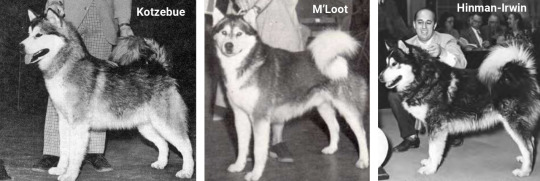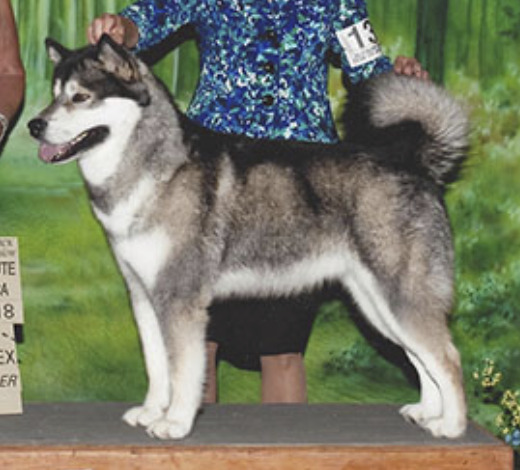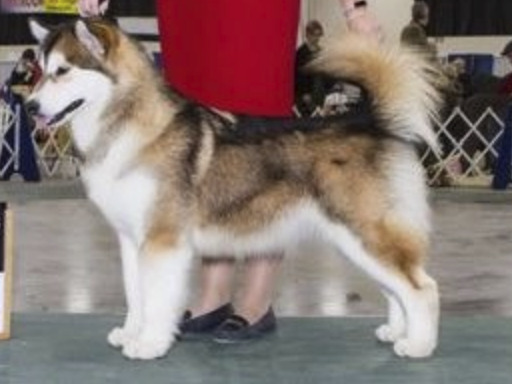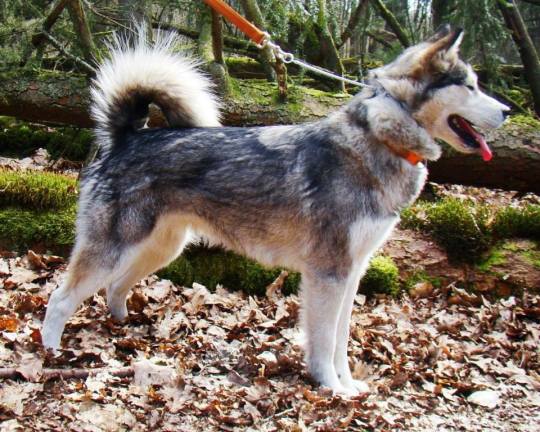#anyways i have a heavy preference towards kotzebue bc i personally see more dogs with kotzebue heavy pedigrees
Explore tagged Tumblr posts
Note
If you would like, please talk to us about the strains and the different Visible Traits, because I am a genetics freak and am fascinated by small differences in populations
I am finally getting around to being able to answer asks in more detail again! Thanks for your patience :) To begin there are three "strains" of Malamute and by that I mean there are three separate populations of dogs that were developed on their own to make up the breed today. During World War II sled dogs were used in abundance. The war, in addition to the previous Antarctic expeditions the original strain had been bred for, decimated the breed population to the point the breed was no longer sustainable (around 30 VERY related individuals), so studbooks were opened in the late 1940's and early 1950s with the breed standard being rewritten to adjust for the variation these new genetics allowed in the 1960s.
The three strains are: Kotzebue (developed by Eva Seeley for the Byrd Antarctic Expeditions and accepted as a breed by the AKC in 1935), M'Loot (developed by Paul Voelker for companionship and not registered with the AKC), and the Hinman-Irwin (co-owned (modern description of what occured) between Dick Hinman and Dave Irwin, who was an Arctic Explorer).
Now I must mention that the Hinman-Irwin dogs were very few, more like a concentrated family of dogs and not really a strain. They only make up a very small percentage of modern dogs (often less than 1% depending on pedigree).
Below are dogs of each strain prior to the popularity of strain mixing:

We can use our general knowledge and photographs of pure strain dogs to inform us of modern dogs. There are no modern strain dogs left (some frozen pure Kotzebue semen, but no pure Kotzebue females to put it to).
Kotzebue dogs tend to be smaller, shorter on leg and more broad in the chest. Typically grey & white (domino), agouti or black and tan in color with little other variation. Smaller ears, more blunt muzzle shape, tend to be straighter in the rear (as we often see with Inuit dogs as well). Many modern dogs with heavy Kotzebue pedigrees also fit within the original 1935 standard which is often why you'll get some M'Loot influenced folks complaining that certain malamutes are being bred too small and fast. With Kotzebue heavy pedigree dogs I expect energetic temperaments with good drive to work as the line was so concentrated and set type so fast in the beginning (less variation).
M'Loot dogs tend to be bigger and taller on leg. They have narrower chests and come in a wider variety of colors (white and red come from this line typically). Larger, often lower set ears and a rear with better angulation. Even though they and the other strains are clearly of one dog type, they fall less within the Inuit dog silhouette and size than Kotzebue dogs. The standard had to be adjusted specifically to accommodate the size difference between this strain and the original dogs as they are often significantly larger (Large Kotzebue males are in the 85 pound range and large M'Loot males are within the 100+ pound range with their ideal being in that 85...thus why the desirable compromised size is 85 pounds for a male in the modern standard). M'Loot dogs also tend to be more dog aggressive.
The traits of the Hinman-Irwin dogs are less distinct and their influence on the breed is very small so I typically stick to Kotzebue vs M'Loot when talking about pedigrees in which one strain dominates. There just is no modern dog where Hinman-Irwin even makes up a double digit percentage.


Above are two related bitches with good (if not excellent) show results, I think even here it is clear what dog has more Kotzebue in her pedigree and which has more M'Loot just based on their heads and angulation.
Meanwhile I feel this bitch is VERY M'Loot-ey:

and this bitch is very Kotzebue:

(note that I have chosen short coat bitches in show stacks to most equally illustrate this, many pet bred Malamutes tend to be exaggerated M'Loot type and overly heavy so not used as an example here).
I understand that for some folks this narrowing down of subtle traits seems deranged or even non-existent, but these things become really easily seen when you're more familiar with the breed. It's not definitive either, because genetics work in a way that is often beyond human prediction you get dogs like Sigurd (very M'Loot looking) out of a heavy Kotzebue pedigree from a breeder looking to produce dogs to that original Kotzebue 1935 standard. All dogs are mixed strain though so these things happen and they're not bad either, it's a good thing that the breed has a wide range of phenotypes available. It's a good thing that we opened our studbook to increase our diversity, but people are also allowed to have preferences between what 'type' they prefer. I just happen to prefer Kotzebue, but others might prefer M'Loot influenced dogs and that's perfectly fine too!
#faq#alaskan malamute#m'loot#kotzebue#hinman-irwin#dogblr#anyways i have a heavy preference towards kotzebue bc i personally see more dogs with kotzebue heavy pedigrees#doing real work and having decent working drives#i also think they look a bit more refined and less clumsy/coarse#under his m'loot-ey worm body#sigurd does have a very typical kotzebue head shape so there's that#i find kotzebue heads have less stop overall to the muzzle but the muzzle itself is shorter#that's something that really sets the heads apart for me#additionally eye shape i find a lot of m'loot dogs have a rounder lighter eye (subtle but there)#and i do agree m'loot influenced dogs bring a lot to the angulation of the breed#although one has to ask is it TOO much angulation for a freighting dog#considering that inuit dogs tend to have less than malamutes
92 notes
·
View notes